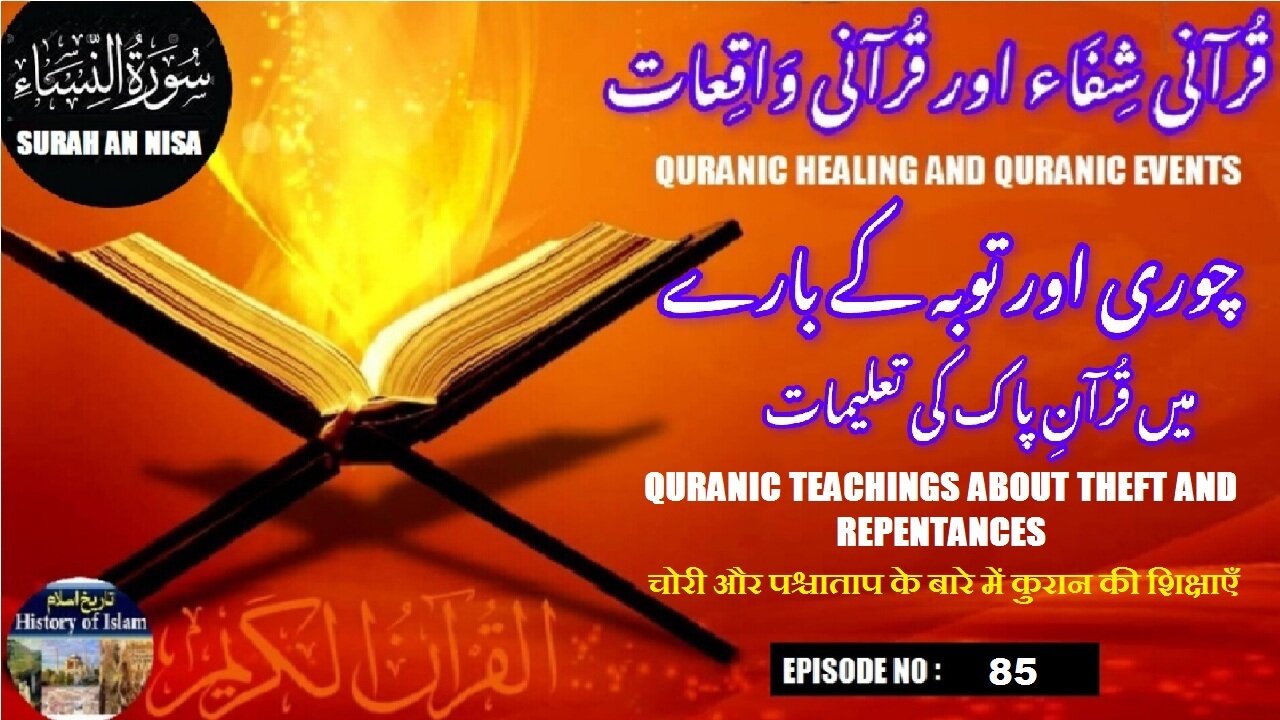Premium Only Content

Quranic teachings about theft and repentance چوری اور توبہ کے بارے میں قرآنی تعلیمات
@islamichistory813 #healing #and #events #from #the #quran #historical #stories #and #events #quranicstories #selfhealing #success #stories #striking #events #in #history #quranstories, #storiesfromthequran #religious #creation #stories #trending #quran #short #historical #loves #historical #heroes #what #is #true #strength #calm #quran #recitation #for #babies #islamic #healing
The Quran’s Teachings on Theft and Repentance | Understanding Surah Al-Ma’idah verses 38–39
Brothers, sisters, friends and elders Assalamu Alaikum, wa Rahmatullahi wa Barakatuhu, we are presenting the 85th episode of the Islamic informative video based on healing and events from the Holy Quran, and in this video we will describe, The Quran’s Teachings on Theft and Repentance | Understanding Surah Al-Ma’idah verses 38–39
Verses 38–39 of Surah Al-Ma’idah address the serious issue of theft and its consequences within the framework of Islamic law, emphasizing both justice and mercy. These verses prescribe a clear legal punishment for theft, highlighting the importance Islam places on protecting property rights and maintaining social order. However, alongside this stern prescription is a profound call to sincere repentance, underscoring that the ultimate goal of punishment is not merely retribution but reform and spiritual redemption.
Verse 38 of Surah Al-Ma’idah states: **“As to the thief, male or female, cut off their hands: a punishment by way of an exemplary punishment from Allah for their crime.”** This injunction is one of the most well-known and often discussed verses regarding criminal justice in the Quran. The cutting off of the hand is prescribed as a *hudud* punishment, which means it is a fixed penalty mandated by divine law for specific crimes. This punishment is intended to serve as a deterrent, protecting the community from theft, which is a violation of trust and social stability. Theft disrupts the sense of security essential for peaceful coexistence, harms individuals and families, and undermines the moral fabric of society.
The verse explicitly mentions both men and women, signifying the equal application of justice regardless of gender. It also describes the punishment as “an exemplary punishment from Allah,” indicating its role in setting a clear and public standard against theft. However, it is crucial to understand that Islamic jurisprudence has traditionally imposed very strict conditions before such a punishment can be applied. The act of theft must be proven beyond doubt, the stolen property must meet a minimum value threshold, and the thief must have acted without compulsion or necessity. These safeguards ensure that the punishment is reserved only for clear, intentional theft, protecting against injustice and abuse.
What makes these verses particularly significant is the balance they strike between justice and mercy, which becomes apparent in verse 39 of Surah Al-Ma’idah. It offers a hopeful and compassionate alternative: **“But if the thief repents after their crime and reforms, Allah will turn to them in forgiveness. Indeed, Allah is Forgiving and Merciful.”** This verse reminds us that even for serious crimes, the door to forgiveness remains open. Sincere repentance can erase past sins and restore the individual’s spiritual standing. This emphasis on repentance reflects the Quran’s broader theme that divine justice is not merely punitive but also restorative.
The call to repentance involves a heartfelt acknowledgment of wrongdoing, remorse for the harm caused, and a genuine commitment to change one’s behavior. Islam encourages believers to seek forgiveness and turn back to God’s guidance, offering a path to redemption even after serious transgressions. This merciful aspect reinforces that the ultimate aim of punishment is not only to safeguard society but also to guide wrongdoers towards spiritual healing and moral reform.
The social implications of these verses are profound. Theft is addressed as a crime that threatens the well-being of the entire community by undermining trust and security. The prescribed punishment serves to deter would-be offenders and reassure victims that justice will be upheld. At the same time, the possibility of repentance and forgiveness serves as a reminder that no one is beyond redemption. This dual approach promotes a society that values both accountability and compassion.
Historically, Islamic jurists have debated and refined the application of these punishments to ensure fairness and justice. The threshold for theft to warrant such a penalty is high, reflecting the seriousness of cutting off a hand, both physically and symbolically. Many scholars emphasize the importance of exploring all avenues for restitution and reconciliation before resorting to corporal punishment. Additionally, the conditions of necessity and compulsion—such as stealing out of extreme hunger—can exempt an individual from this punishment, showing the flexibility and humanity within Islamic law.
The verses also serve as a powerful spiritual lesson. They remind believers of the consequences of violating the rights of others and the importance of self-discipline and integrity. The sanctity of others’ property is closely linked to the broader ethical framework that Islam promotes, including honesty, trustworthiness, and respect for social rights. By placing theft within the scope of divine law, the Quran elevates the act from a mere legal offense to a moral and spiritual failure that requires both legal accountability and inner reform.
In conclusion, verses 38–39 of Surah Al-Ma’idah provide a comprehensive approach to dealing with theft in Islam—one that combines clear, firm justice with the hope of mercy through sincere repentance. The prescribed punishment underscores the seriousness of theft as a social crime, while the call to repentance highlights the compassionate nature of divine justice. These verses challenge individuals to uphold integrity and respect for others’ rights while reminding communities of the importance of maintaining justice tempered with mercy. Ultimately, the Quran teaches that while punishment is necessary to protect society, the door to forgiveness and transformation is always open for those who truly seek it.
With this, we ask for your permission until tomorrow and pray to Allah Almighty to grant us the ability to act on the Quran and Hadith, Amen
Allah Hafiz
===========================
-
 6:31
6:31
ISLAMIC HISTORY
1 hour agoBiography of Abd al-Malik Ibn Qarib Isma'i سوانح حیات عبد الملک ابن قریب اسمائی
-
 LIVE
LIVE
Rebel News
41 minutes agoLibs blame Poilievre, Cons call to scrap TFW program, Carney on Canada-US relations | Rebel Roundup
267 watching -
 LIVE
LIVE
The Mel K Show
1 hour agoMORNINGS WITH MEL K - Constitution Incompatible with Globalist Goals 9-16-25
713 watching -
 35:35
35:35
Grant Stinchfield
2 hours agoRFK Jr. Speaks Out: The Pain of Assassination & the Loss of Charlie Kirk
8501 -
 1:59:33
1:59:33
Benny Johnson
3 hours agoKash Patel Testifying LIVE Now on Charlie Kirk Assassination, Trump to Declare Antifa TERRORISTS?!
72.5K67 -
 2:07:38
2:07:38
Timcast
4 hours ago🚨LIVE: Kash Patel Testifies Over Charlie Kirk Assassination In Senate | Tim Pool
82.9K65 -
 1:01:08
1:01:08
Trumpet Daily
1 hour agoTrumpet Daily LIVE | Sept. 16, 2025
6.4K1 -
 LIVE
LIVE
The Shannon Joy Show
2 hours agoTrojan Horse Trump Pushing ‘Worse Than Biden’ Speech Control Using Kirk Killing. Guest Brett Miller
239 watching -
 1:01:35
1:01:35
VINCE
4 hours agoThe Left's 'Malignant' Violence Problem | Episode 126 - 09/16/25
225K132 -
 LIVE
LIVE
LFA TV
7 hours agoLFA TV ALL DAY STREAM - TUESDAY 9/16/25
3,898 watching